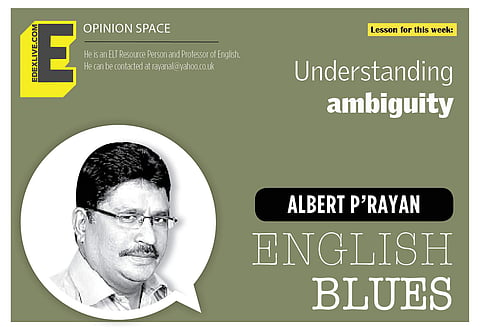

This is a good example of ambiguity:
Janet: Call me a taxi, please.
Benet: You want me to get you a taxi or tell you you’re a taxi?
A sentence that is ambiguous can have more than one interpretation. The sentence ‘Call me a taxi’ can be interpreted in two different ways because the word ‘call’ has more than one meaning. In fact, ‘call’, as a verb, has ten different meanings. Let’s look at some of them.
We can call someone or something by a particular name
Ms X: Dr Gomez, shall we meet next week?
Ms Y: You need not be so formal. Will you please call me Rini?
To describe someone or something as a particular thing: I wouldn’t call it a joke.
To call means to phone: Please call me around 6 o’clock in the evening.
If we call a meeting, we arrange for it to take place at a particular time: Will the Prime Minister ever call a press conference?
To call a game or an event means to cancel it. We can also use the phrasal verb ‘call off’ to mean cancel: As expected, IPL 2021 has been called (called off).
If a bus or a train calls somewhere, it stops there for a short time: I’m not sure whether the bus will call anywhere in between. You’d better buy some snacks here itself.
There are many types of ambiguities: 1) lexical ambiguity, 2) syntactic ambiguity, etc. Lexical ambiguity refers to the presence of two or more possible meanings for a single word as in the example, ‘Call me a taxi’. Here are two more examples of lexical ambiguity:
1. I saw a bat.
2. Let’s go to the bank.
These are isolated sentences and the context is not given. In the first example, the word bat can have either of these meanings: 1) a small flying animal or 2) a shaped piece of wood used for hitting a ball. The word saw can have either of these meanings: 1) ‘saw’ is the past tense of ‘see’, and 2) ‘saw’, as a verb, means to cut something using a saw. In the second sentence, the word bank can mean either an organisation where people invest or keep their money or an area of land of next to a river.
Syntactic ambiguity refers to the presence of two or more possible meanings within a sentence or sequence of words as in the example, ‘The thief killed the woman with a gun.’ How do we interpret the sentence? Who had a gun: the thief or the woman? The sentence is ambiguous as it is not clear whether the thief or the woman had a gun. The phrase ‘the woman with a gun’ can mean that the woman had a gun. If the question ‘How did the thief kill the woman?’ is asked, one can say that the thief used a gun to kill the woman. Some newspaper headlines are funny and open to multiple interpretations. Here are some examples of ambiguity:
1. Kids make nutritious snacks.
2. Lung cancer in women mushrooms.
3. Hospitals are sued by seven foot doctors.
In the English language, many words have multiple meanings. Those who have good exposure to the language are able to guess the meanings in context and detect ambiguity in sentences.
